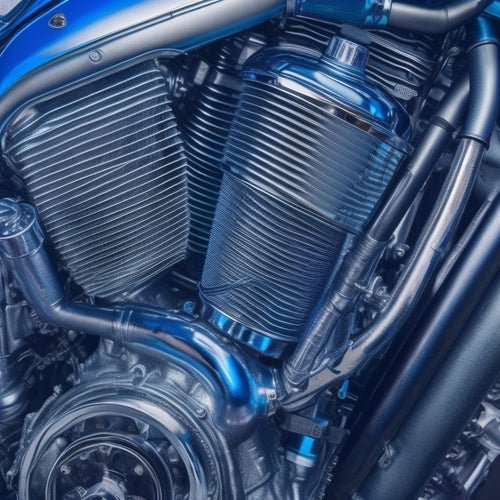
Top Solar Panel Efficiency Ratings Revealed Online
Share
You're likely searching for the top-rated solar panels with impressive efficiency ratings, but be cautious - some manufacturers exaggerate their claims. Look for brands with high ratings and reviews, prioritizing those with impressive warranties and industry compliance. Efficiency ratings range from 15% to over 22%, with industry leaders like SunPower and Panasonic boasting high-efficiency ratings. To make an informed decision, understand the metrics used to calculate efficiency ratings and compare performances under standardized test conditions. Now, discover the truth behind solar panel efficiency ratings and uncover the best options for your investment - there's more to explore.
Key Takeaways
• Understand the metrics used to calculate solar panel efficiency ratings, including standardized test conditions (STC) and performance ratios.
• Compare the efficiencies of various solar panels, focusing on high ratings ranging from 15% to over 22% from top brands like SunPower and Panasonic.
• Look for credible sources like the International Electrotechnical Commission (IEC) and National Renewable Energy Laboratory (NREL) for reliable efficiency ratings.
• Be cautious of exaggerated manufacturer claims and verify ratings through third-party certifications and testing data from recognized organizations.
• Prioritize high-quality panels with durable components, considering factors beyond efficiency ratings, such as material selection and manufacturing processes.
Top Rated Solar Panels Online
When shopping for solar panels online, you'll come across a plethora of options, but narrowing down the search to the top-rated ones can save you time and guarantee a reliable investment. To make certain you're getting the best, look for solar panels with impressive warranties. A thorough warranty can provide peace of mind, covering repairs and replacements for up to 25 years or more.
When browsing online, prioritize products with high ratings and reviews from verified customers. Be cautious of extremely low prices, as they may indicate low-quality products. Instead, focus on finding the best value for your money.
Additionally, pay attention to the manufacturer's reputation, certifications, and industry compliance. Reputable brands will proudly display their certifications, such as UL (Underwriters Laboratories) or IEC (International Electrotechnical Commission).
Efficiency Ratings Comparison Chart
As you explore the Efficiency Ratings Comparison Chart, you'll notice a detailed ranking of solar panels by their efficiency ratings.
You'll want to understand the metrics used to calculate these ratings, so let's break down the key efficiency metrics that set top brands apart.
Panel Efficiency Rankings
You can compare the efficiencies of various solar panels using the following chart, which ranks popular models by their efficiency ratings. This ranking provides a thorough overview of the top-performing solar panels in the market, helping you make an informed decision for your energy needs.
The chart highlights the top models, showcasing their efficiency ratings, which range from 15% to over 22%.
Efficiency Metrics Explained
To better understand the rankings and make a more informed decision, it's helpful to know how solar panel efficiency is measured and what factors affect it. You'll want to grasp the metrics that determine a panel's efficiency, as they directly impact your energy output.
The most common metric is the efficiency rating, which represents the percentage of sunlight converted into electrical energy. Look for panels with high efficiency ratings, as they produce more power per unit area.
Energy benchmarks, such as the standardized test conditions (STC) rating, provide a baseline for evaluating panel performance. This rating measures a panel's performance under ideal laboratory conditions.
However, real-world conditions can vary significantly, which is where performance ratios come in. These ratios adjust the STC rating to reflect real-world conditions, giving you a more accurate picture of a panel's performance.
Top Brands Compared
Seven top brands dominate the solar panel market, with efficiency ratings ranging from 18.1% to 22.8%, as shown in the comparison chart below.
As you explore the top brands, you'll notice that industry leaders like SunPower and Panasonic boast high-efficiency ratings, exceeding 21%. In contrast, brands like Canadian Solar and Trina Solar offer more affordable options with slightly lower efficiency ratings.
When selecting a solar panel brand, you'll want to take into account factors beyond efficiency ratings, such as brand loyalty and warranty terms.
As you weigh your options, keep in mind that industry trends are shifting towards higher-efficiency panels. Brands that invest in research and development, like LG and Hanwha Q CELLS, are driving this trend.
Panel Quality and Durability Factors
When evaluating solar panels, you'll want to assess the quality and durability of the panels themselves.
You should look for panels with a robust build that can withstand various environmental conditions, as this will directly impact their performance and lifespan.
Panel Build Quality Matters
You can greatly impact the efficiency of your solar panel system by selecting high-quality panels with durable components that can withstand harsh environmental conditions. This is essential because a well-built panel can maintain its performance over time, guaranteeing you get the most out of your investment.
When evaluating panel build quality, consider the material selection, which affects durability and performance. Look for manufacturers with rigorous manufacturing processes that ensure consistency and quality. Factory inspections and supply chain transparency are also vital, as they guarantee that components meet high standards. Additionally, worker training programs and quality control checks help prevent defects and ensure that panels meet specifications.
Module Efficiency Variance
Between 15% to 20% efficiency variance can occur between high- and low-quality solar panels, primarily due to differences in panel quality and durability factors.
You might wonder, what contributes to this significant discrepancy? The answer lies in the materials and manufacturing processes used. High-quality panels are built with more efficient photovoltaic cells, better temperature coefficients, and superior encapsulation materials, ensuring minimal energy losses. In contrast, low-quality panels may compromise on these aspects, leading to reduced energy output.
Climate impacts, such as extreme temperatures, humidity, and UV exposure, also play a significant role in module efficiency variance. As a result, energy losses can add up quickly, reducing the overall performance of your solar panel system.
When selecting solar panels, it's important to take into account these factors to guarantee efficient energy harvesting and minimize energy losses. By choosing high-quality panels, you can maximize your energy output and reduce your carbon footprint.
Durability Testing Standards
To guarantee solar panels can withstand environmental stresses, manufacturers put their products through rigorous durability testing, which involves exposing them to simulated real-world conditions, such as extreme temperatures, humidity, and UV radiation. This testing ensures that the panels can perform at their best in various climates and weather conditions.
You want to know that your solar panels can withstand the harshest weather conditions, and durability testing provides that assurance. As a consumer, you should look for manufacturers that adhere to industry standards for durability testing. This includes testing for weather resistance, which involves exposing panels to simulated weather conditions such as hail, snow, and extreme temperatures.
Manufacturers that follow industry standards, such as the International Electrotechnical Commission (IEC), can provide you with confidence in the durability of their products. By choosing a manufacturer that prioritizes durability testing, you can rest assured that your solar panels will perform efficiently for years to come.
Online Review Sites to Trust
Depending on credible online review sites is crucial when researching solar panels, as they provide valuable insights from customers who've hands-on experience with different brands and models. When evaluating online review sites, you should prioritize site credibility and review authenticity. Look for sites with a proven track record of fairness, transparency, and strict moderation policies to guarantee reviews are genuine and unbiased. Be cautious of fake or paid reviews that can mislead your purchasing decision.
You can also check if the site allows verified purchases, as this adds an extra layer of authenticity to the reviews. Additionally, pay attention to the overall rating distribution, as a balanced mix of positive and negative reviews is often a sign of a trustworthy site. Avoid sites with an overwhelmingly positive or negative sentiment, as this could indicate manipulation.
Manufacturer Efficiency Claims Debunked
It's crucial to often come across manufacturer claims of exceptionally high solar panel efficiency ratings, but surprisingly few of these claims hold up to scrutiny. Upon closer inspection, many of these claims are exaggerated or based on unrealistic testing conditions.
It's important to separate fact from fiction, as misleading marketing tactics can lead to disappointment and financial losses. Industry watchdogs have exposed numerous instances of inflated efficiency ratings, highlighting the importance of verifying claims through reputable sources.
When evaluating manufacturer claims, look for third-party certifications and testing data from recognized organizations, such as the International Electrotechnical Commission (IEC) or the National Renewable Energy Laboratory (NREL). Be wary of claims that seem too good to be true, as they often are.
Accurate Rating Sources Revealed
When verifying manufacturer claims, you can rely on reputable organizations that provide accurate solar panel efficiency ratings, such as the International Electrotechnical Commission (IEC) and the National Renewable Energy Laboratory (NREL), which conduct rigorous testing and certification processes. These organizations employ standardized rating methodologies to guarantee consistency and accuracy. You can trust their ratings, as they're based on scientific testing, not marketing claims.
When researching solar panels, it's vital to assess the credibility of the source. Look for organizations with a proven track record of unbiased testing and certification. The IEC and NREL are two examples of credible sources that provide reliable efficiency ratings. Their rating methodologies are transparent, and their testing procedures are designed to simulate real-world conditions. By relying on these sources, you can make informed decisions about your solar panel investment.
Frequently Asked Questions
Can I Use Solar Panels in Areas With Low Sunlight?
You can still harness solar power in areas with low sunlight, but it's important to take into account the impact of cloudy climates and shaded roofs on energy output, necessitating more efficient panels or larger systems.
How Long Does It Take to Recoup the Cost of Solar Panels?
As you gaze upon the sleek, solar-powered roof, you wonder how long it'll take to reap the financial benefits. The payback period varies, but a solid solar ROI can be achieved in 5-7 years, depending on location and system efficiency.
Do Solar Panels Work During Power Outages?
You'll be glad to know that solar panels can work during power outages if you have a grid backup system with energy storage, allowing you to harness renewable energy even when the grid is down.
Can I Install Solar Panels on My Own?
Coincidentally, you're wondering if you can install solar panels on your own. While it's possible, be aware of DIY challenges like electrical connections and roof assessments, and don't forget to check local regulations before taking on the project.
Are There Any Government Incentives for Solar Panels?
You'll be pleased to know that, yes, there are government incentives for solar panels, including tax credits and renewable grants, which can greatly offset the upfront costs of installation, making it a more affordable option for you.
Related Posts
-

Charging On-The-Go: Portable Battery Solutions Online
You're always on the move, and your devices need to keep up - that's why having a reliable portable battery solution ...
-

Why Are Online Prices for Panels So Low?
When you buy panels online, you're often taking advantage of a combination of factors that drive prices lower. You're...
-

Boosting Motorcycle Performance With High-Torque Upgrades
You're seeking to maximize your motorcycle's full potential with high-torque upgrades. By swapping to a high-torque m...


